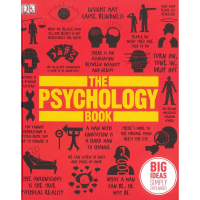Top 10 Best Books On Neuropharmacology
Neuropharmacology is a fascinating field that explores how drugs affect the nervous system and the brain. With so many books on neuropharmacology out there, it ... read more...can be overwhelming to choose the right one. In this article, we've compiled a list of some of the best books on neuropharmacology to help you get started.
-
Drugs and Behavior: An Introduction to Behavioral Pharmacology is an enlightening book written by Stephanie Hancock and William A. McKim, which provides a comprehensive overview of the neuropharmacology of psychoactive substances. This book is a valuable resource for students and professionals in the field of psychology, pharmacology, and neuroscience who are interested in understanding the effects of drugs on human behavior.
Stephanie Hancock is an associate professor of psychology at St. Mary's College of Maryland. She completed her Ph.D. in Neuroscience at the University of Virginia and has published numerous research articles on the behavioral and neurobiological effects of drugs. William A. McKim is a Professor Emeritus of Psychology at the University of Georgia. He has extensive experience in teaching courses related to behavioral pharmacology and has authored multiple books and articles on the subject.
Drugs and Behavior introduces the fundamental concepts and principles of behavioral pharmacology in a clear and concise manner. The book covers a wide range of topics, including the history of drug use, drug classification, drug absorption and distribution, drug metabolism and elimination, and drug effects on behavior. The authors also explore the mechanisms of drug action in the brain, including the effects of drugs on neurotransmitters, receptors, and neural circuits.
Among the best books on neuropharmacology, the book provides a balanced and objective perspective on drug use and abuse, highlighting both the beneficial and harmful effects of drugs on human behavior. The authors also discuss the social and cultural factors that influence drug use and abuse, as well as the current policies and treatments for drug addiction.
Author: Stephanie Hancock and William A. McKim
Link to buy: https://www.amazon.com/Drugs-Behavior-Introduction-Behavioral-Pharmacology-ebook/dp/B06Y1KPXJK/
Ratings: 4.5 out of 5 stars (from 99 reviews)
Best Sellers Rank: #620,880 in Kindle Store
#2 in Neuropsychopharmacology
#4,082 in Medical General Psychology
#8,881 in Counseling & Psychology

Image by Steve Buissinne from Pixabay 
Image by PublicDomainPictures from Pixabay -
From Chocolate to Morphine: Everything You Need to Know About Mind-Altering Drugs is a fascinating and informative book on neuropharmacology written by Andrew Weil, a physician, and Winifred Rosen, a medical journalist. The book delves into the effects and dangers of a wide range of psychoactive substances, from commonly used drugs like caffeine and alcohol to powerful and addictive narcotics like morphine and heroin.
The book is a comprehensive and accessible guide to the complex world of mind-altering drugs. It explains the chemical and biological mechanisms that underlie the effects of these drugs on the brain and body, as well as their history, cultural significance, and social context. The authors explore the use and abuse of drugs in different cultures and societies, and examine the impact of drug use on health, mental well-being, and social behavior.
From Chocolate to Morphine is a must-read for anyone interested in understanding the science and culture of psychoactive substances. The book is written in a clear and engaging style, and is backed up by extensive research and scientific evidence. The authors present a balanced and nuanced perspective on drug use, emphasizing the potential benefits as well as the risks and dangers.
Author: Winifred Rosen and Andrew Weil
Link to buy: https://www.amazon.com/Chocolate-Morphine-Everything-About-Mind-Altering-ebook/dp/B003UV919M/
Ratings: 4.5 out of 5 stars (from 150 reviews)
Best Sellers Rank: #731,542 in Kindle Store
#3 in Neuropsychopharmacology
#8,030 in Medical eBooks
#33,973 in Health, Fitness & Dieting (Kindle Store)

Image by PublicDomainPictures from Pixabay 
Image by Michal Jarmoluk from Pixabay -
The Psychopharmacology Treatment Planner, authored by Charles B. Nemeroff, Arthur E. Jongsma, and David C. Purselle, is considered one of the best books on neuropharmacology. This book provides a comprehensive guide to the use of psychotropic medications in the treatment of mental health disorders.
Charles B. Nemeroff, MD, PhD, is a well-known and respected psychiatrist who has written over 1000 scientific articles and book chapters in the field of psychiatry. He has received numerous awards and honors for his work, including being listed as one of the top 400 most influential biomedical researchers in the world by Thomson Reuters. Arthur E. Jongsma, Jr., PhD, is a licensed psychologist and the founder of the PracticePlanners series, which includes the Psychopharmacology Treatment Planner. David C. Purselle, MD, is a board-certified psychiatrist with expertise in psychopharmacology and substance abuse.
The book is designed to help mental health professionals, including psychiatrists, psychologists, social workers, and counselors, develop effective treatment plans for patients with mental health disorders. It provides detailed information on psychotropic medications, including indications, contraindications, dosages, side effects, and drug interactions. The book also includes a range of treatment plan templates that can be customized to meet the needs of individual patients.
The Psychopharmacology Treatment Planner is an essential resource for mental health professionals who want to stay up-to-date with the latest research and best practices in psychopharmacology. It is written in a clear and concise style and is designed to be easy to use, making it an invaluable tool for anyone who is involved in the treatment of mental health disorders.
Author: Charles B. Nemeroff, Arthur E. Jongsma and David C. Purselle
Link to buy: https://www.amazon.com/Psychopharmacology-Treatment-Planner-PracticePlanners-Book-ebook/dp/B000PY3WP6/
Ratings: 4.2 out of 5 stars (from 16 reviews)
Best Sellers Rank: #1,885,432 in Kindle Store
#19 in Neuropsychopharmacology
#159 in Practice Management
#169 in Psychopharmacology

Image by mmmCCC from Pixabay 
Image by PublicDomainPictures from Pixabay -
Buzzed: The Straight Facts About the Most Used and Abused Drugs from Alcohol to Ecstasy is a highly informative and extensively researched book on the topic of neuropharmacology, authored by Cynthia Kuhn, Scott Swartzwelder, and Wilkie Wilson. The book provides a comprehensive overview of the most commonly used and abused drugs, including alcohol, nicotine, marijuana, prescription drugs, and stimulants like cocaine and ecstasy.
The authors of Buzzed are all renowned experts in the field of neuropharmacology and have spent decades researching the effects of drugs on the brain and behavior. Their extensive research has resulted in a book that is both scientifically accurate and highly accessible to readers of all backgrounds.
One of the strengths of Buzzed is its unbiased approach to the topic of drug use. Rather than taking a moralistic or judgmental stance, the authors present the facts about each drug, including its history, chemical composition, effects on the brain and body, and potential risks and benefits. This approach allows readers to make informed decisions about drug use based on factual information rather than fear or misinformation.
The book is organized into chapters that cover each drug in detail, providing readers with a thorough understanding of the effects and risks associated with each substance. The authors also address common misconceptions about drug use, such as the idea that marijuana is a harmless drug or that prescription drugs are safer than street drugs.
Author: Cynthia Kuhn, Scott Swartzwelder and Wilkie Wilson
Link to buy: https://www.amazon.com/Buzzed-Straight-Abused-Alcohol-Ecstasy/dp/0393356469/
Ratings: 4.8 out of 5 stars (from 464 reviews)
Best Sellers Rank: #70,614 in Books
#38 in Medical Encyclopedias
#63 in Drug Dependency & Recovery (Books)
#191 in Alcoholism Recovery

Image by PublicDomainPictures from Pixabay 
Image by Ewa Urban from Pixabay -
Drugs, the Brain, and Behavior: The Pharmacology of Drug Use Disorders is a comprehensive guide to the fascinating world of neuropharmacology. Written by John Brick and Carlton K. Erickson, this book provides an in-depth understanding of how drugs interact with the brain and affect behavior, with a focus on substance abuse and addiction.
John Brick, the lead author of the book, is a renowned neuropharmacologist with over 35 years of experience in the field. He is the director of the Division of Population Health Sciences at the National Institute on Alcohol Abuse and Alcoholism (NIAAA), where he has conducted extensive research on alcohol and drug addiction. Carlton K. Erickson, the co-author, is also a well-known researcher in the field of neuropharmacology. He is the director of the Addiction Science Research and Education Center at the University of Texas, where he has spent over 30 years studying the effects of drugs on the brain and behavior.
The book starts with an introduction to neuropharmacology and the basic principles of drug action in the brain. It then delves into the specific effects of various classes of drugs, including alcohol, opioids, stimulants, and hallucinogens. The authors provide detailed information on the pharmacology of each drug, as well as its short- and long-term effects on behavior, cognition, and emotion. They also discuss the mechanisms of addiction and the factors that contribute to the development of substance abuse disorders.
One of the strengths of Drugs, the Brain, and Behavior is its interdisciplinary approach to the topic. The authors draw on research from neuroscience, pharmacology, psychology, and sociology to provide a comprehensive understanding of substance abuse and addiction. The book is written in a clear and accessible style, making it a valuable resource for students, researchers, and healthcare professionals alike.
Author: John Brick and Carlton K. Erickson
Link to buy: https://www.amazon.com/Drugs-Brain-Behavior-Pharmacology-Disorders-ebook/dp/B0BKWYYKKZ/
Ratings: 4.5 out of 5 stars (from 45 reviews)
Best Sellers Rank: #1,429,922 in Kindle Store
#773 in Neuropsychology (Kindle Store)
#1,565 in Medical Neuropsychology
#2,563 in Popular Neuropsychology

Image by 😊 Thanks for visit 💋 Support me via Coffee button ☕ from Pixabay 
Image by PublicDomainPictures from Pixabay -
Molecular Neuropharmacology, authored by Eric J. Nestler, Paul J. Kenny, Scott J. Russo, and Anne Shaefer, is a comprehensive book that provides an in-depth understanding of the molecular mechanisms underlying the actions of drugs on the nervous system. This book is an essential resource for students, researchers, and clinicians interested in the field of neuropharmacology, and it is regarded as one of the best books on the subject.
The authors of Molecular Neuropharmacology are experts in the field of neuroscience, with extensive experience in research, teaching, and clinical practice. Eric J. Nestler is the Nash Family Professor of Neuroscience and Director of the Friedman Brain Institute at the Icahn School of Medicine at Mount Sinai. Paul J. Kenny is the Ward-Coleman Chair in Translational Neuroscience and the Director of the Experimental Therapeutics Institute at the Icahn School of Medicine at Mount Sinai. Scott J. Russo is an Assistant Professor of Neuroscience and Psychiatry at the Icahn School of Medicine at Mount Sinai. Anne Schaefer is an Associate Professor of Neuroscience and Psychiatry at the Icahn School of Medicine at Mount Sinai.
The book's introduction provides an overview of the basic principles of neuropharmacology, including the molecular targets of drugs, the pharmacokinetics and pharmacodynamics of drugs, and the ways in which drugs affect the nervous system. It also covers the use of animal models to study the effects of drugs on the nervous system, and the application of neuropharmacology to the treatment of neurological and psychiatric disorders.
Author: Eric J. Nestler, Paul J. Kenny, Scott J. Russo and Anne Shaefer
Link to buy: https://www.amazon.com/Molecular-Neuropharmacology-Foundation-Clinical-Neuroscience/dp/1260456900/
Ratings: 4.4 out of 5 stars (from 29 reviews)
Best Sellers Rank: #495,344 in Books
#136 in Popular Psychology Psychopharmacology
#146 in Pain Medicine Pharmacology
#472 in Neuroscience (Books)

Image by Moein from Pixabay 
Photo by Pixabay from Pexels -
Essential Neuropharmacology, written by Stephen D. Silberstein, Michael J. Marmura, and Hsiangkuo Yuan, is an essential guide for prescribers, students, and researchers interested in neuropharmacology. This book presents a comprehensive overview of the mechanisms and actions of various drugs used in the treatment of neurological and psychiatric disorders. It is considered one of the best books on neuropharmacology.
The authors' combined expertise in neurology, headache medicine, and clinical pharmacology offers a unique and multidisciplinary approach to the subject. The book covers topics ranging from the basic principles of neuropharmacology to the latest developments in drug therapy for disorders such as epilepsy, migraine, and depression.
One of the strengths of Essential Neuropharmacology is its clear and concise writing style, which makes the complex subject matter accessible to readers of all levels. The authors use illustrative case studies to highlight the practical application of neuropharmacology in clinical settings.
The book also features numerous tables and figures that summarize important information and provide visual aids for understanding complex concepts. The appendices provide helpful references, including drug tables and dosage guidelines.
Author: Stephen D. Silberstein, Michael J. Marmura and Hsiangkuo Yuan
Link to buy: https://www.amazon.com/Essential-Neuropharmacology-Prescribers-Stephen-Silberstein/dp/1107485541/
Ratings: 4.7 out of 5 stars (from 21 reviews)
Best Sellers Rank: #942,570 in Books (See Top 100 in Books)
#307 in Pain Medicine Pharmacology
#339 in Neurology (Books)
#4,647 in Basic Medical Sciences

Image by Demet BEKTAŞ from Pixabay 
Image by charlykushu from Pixabay -
The Biochemical Basis of Neuropharmacology, co-authored by Jack R. Cooper, Floyd E. Bloom, and Robert H. Roth, is a highly regarded and comprehensive reference book on the subject of neuropharmacology. First published in 1991, the book has since become a classic in the field, offering a thorough overview of the molecular mechanisms underlying the actions of drugs on the nervous system.
The authors, who are all esteemed researchers and experts in the field of neuropharmacology, have written a book that is both accessible to students and valuable to professionals. The book covers a wide range of topics, including the structure and function of neurotransmitters, receptors, and ion channels, as well as the molecular mechanisms of drug action and the pharmacology of drugs used to treat various neurological disorders.
The book is organized into four main sections, each of which focuses on a different aspect of neuropharmacology. The first section provides an overview of the basic principles of neuropharmacology, including the cellular and molecular mechanisms that underlie the actions of drugs on the nervous system. The second section covers the pharmacology of neurotransmitters and their receptors, while the third section focuses on the pharmacology of drugs that act on ion channels. The final section of the book is devoted to the pharmacology of drugs used to treat neurological disorders, including antidepressants, antipsychotics, and antiepileptic drugs.
Author: Jack R. Cooper, Floyd E. Bloom and Robert H. Roth
Link to buy: https://www.amazon.com/Biochemical-Basis-Neuropharmacology-Jack-Cooper/dp/019510398X/
Ratings: 4.4 out of 5 stars (from 18 reviews)
Best Sellers Rank: #3,586,948 in Books
#1,608 in Neurology (Books)

Photo by Chokniti Khongchum from Pexels 
Photo by Polina Tankilevitch from Pexels -
Principles of Drug Therapy in Neurology is an exceptional book on neuropharmacology that explores the principles and practices of drug therapy in the field of neurology. The book is co-authored by Michael V. Johnston and Robert A. Gross and is widely considered as one of the best reference books in the field. The authors have extensive expertise in neuropharmacology and have worked extensively in the field of neuroscience.
The book offers an in-depth understanding of the mechanisms underlying drug therapy in neurology and the various drugs that are used to treat neurological disorders. It covers a wide range of topics, including the pharmacology of drugs used to treat neurological disorders such as epilepsy, multiple sclerosis, Parkinson's disease, and Alzheimer's disease. The authors also explore the various challenges associated with drug therapy in neurology, such as drug resistance, drug interactions, and adverse drug reactions.
The book is divided into several sections, each focusing on a specific aspect of drug therapy in neurology. The authors use a clear and concise writing style, making it easy for readers to understand complex concepts. The book also includes numerous tables, figures, and illustrations that help readers visualize important concepts and mechanisms.
Author: Michael V. Johnston and Robert A. Gross
Link to buy: https://www.amazon.com/Principles-Drug-Therapy-Neurology-Contemporary/dp/0195146832/
Ratings: 4.3 out of 5 stars (from 3 reviews)
Best Sellers Rank: #5,775,973 in Books
#1,801 in Pharmacology (Books)
#3,060 in Neurology (Books)
#3,497 in Pharmacies

Photo by Polina Tankilevitch from Pexels 
Photo by Polina Tankilevitch from Pexels -
Introduction to Behavioral Pharmacology, authored by Thomas Byrne and Alan Poling, is considered one of the best books on neuropharmacology. This comprehensive book provides a detailed overview of the effects of drugs on behavior and how they interact with the nervous system.
The authors, Thomas Byrne and Alan Poling, are both renowned experts in the field of behavioral pharmacology. Thomas Byrne is a professor of psychology and behavioral neuroscience at the University of New Hampshire, and Alan Poling is a professor of psychology at Western Michigan University. Their vast experience and expertise in the field have made Introduction to Behavioral Pharmacology a trusted resource for students and professionals alike.
The book is designed as a textbook for undergraduate and graduate students in psychology, pharmacology, and related fields. It covers the fundamental principles of pharmacology, including drug absorption, distribution, metabolism, and excretion. The authors also explain how drugs interact with the nervous system to produce their effects on behavior, including how they alter neurotransmitter function, and how they affect different brain regions.
Introduction to Behavioral Pharmacology also covers the use of drugs in the treatment of various behavioral disorders, including anxiety, depression, and schizophrenia. The authors provide detailed information on the mechanisms of action of different classes of drugs and their therapeutic uses.
Overall, Introduction to Behavioral Pharmacology is an essential resource for anyone interested in the effects of drugs on behavior and the nervous system. Its clear and concise writing style, coupled with its comprehensive coverage of the topic, make it an ideal textbook for students and a valuable reference for professionals in the field.
Author: Thomas Byrne and Alan Poling
Link to buy: https://www.amazon.com/Introduction-Behavioral-Pharmacology-Thomas-Byrne-ebook/dp/B006P0AIKQ/
Ratings: 4.7 out of 5 stars (from 11 reviews)
Best Sellers Rank: #1,909,951 in Kindle Store
#21 in Neuropsychopharmacology
#171 in Psychopharmacology
#339 in Pharmacology Pain Medicine

Photo by Mikhail Nilov from Pexels 
Photo by Mikhail Nilov from Pexels































